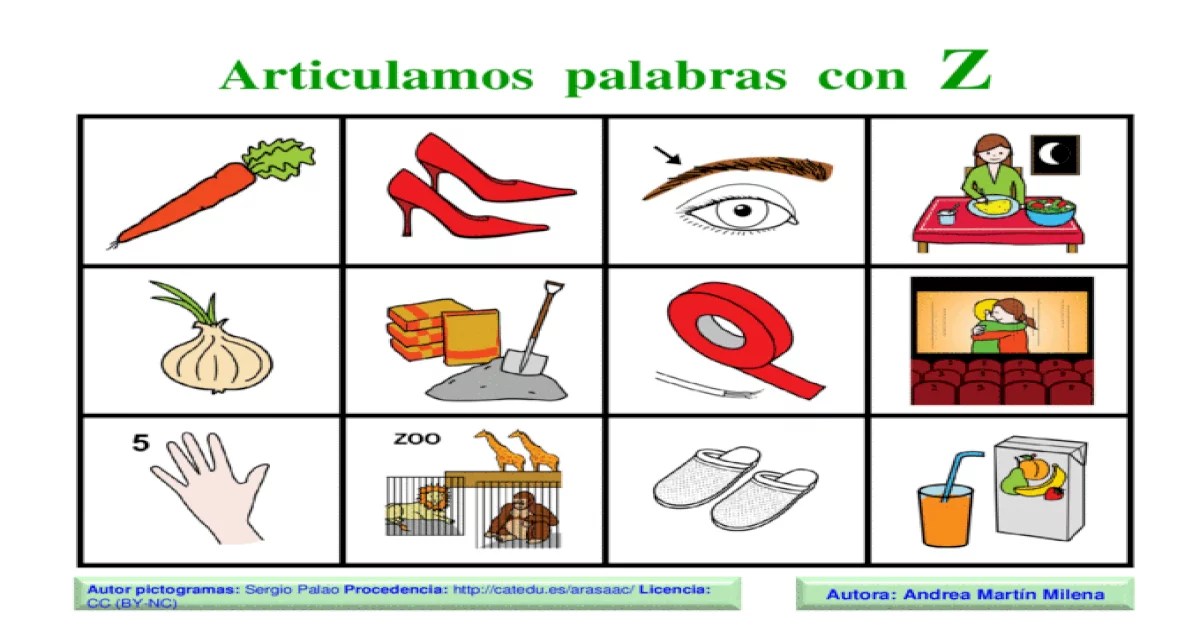Embark on a linguistic adventure as we delve into the captivating realm of words ending in “z” – “palabras que acaben en z.” From their intriguing pronunciations to their rich etymological roots, these words hold a treasure trove of linguistic wonders just waiting to be uncovered.
Prepare to be mesmerized as we explore the diverse categories of words that culminate in the letter “z,” unravel the secrets of their spelling and pronunciation, and trace their fascinating origins across languages and cultures.
List of Words Ending in “z”
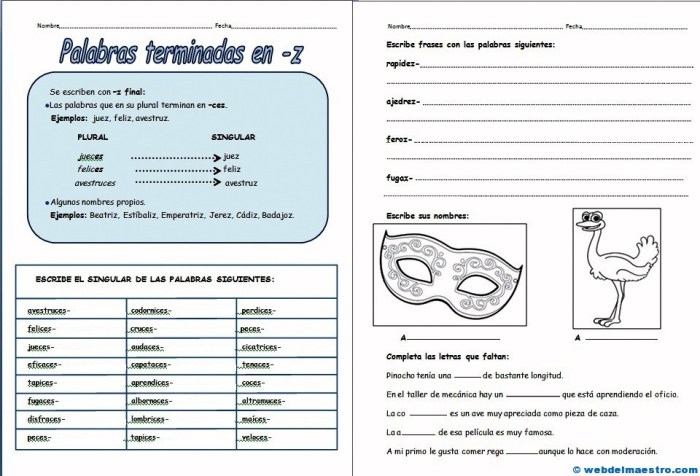
The letter “z” is a voiced alveolar fricative, produced by placing the tongue behind the upper front teeth and directing air over it. It is a relatively uncommon letter in the English language, but it does appear in a variety of words, including nouns, verbs, adjectives, and adverbs.
Here is a comprehensive list of words that end in the letter “z”:
- Buzz
- Fizzes
- Jazz
- Laziness
- Quiz
- Razors
- Whizzes
- XYZ
Pronunciation and Spelling Rules
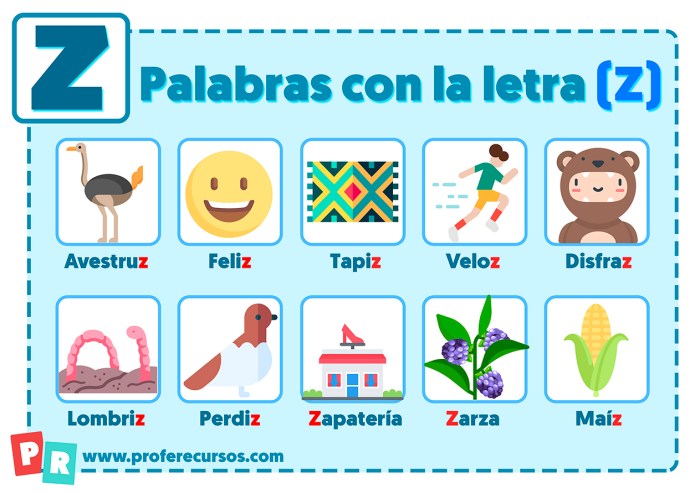
The pronunciation of words ending in “z” follows specific rules, and there are certain spelling patterns and exceptions to these rules. Understanding these guidelines helps with the accurate pronunciation and spelling of words ending in “z”.
Pronunciation Rules
In general, the letter “z” at the end of a word is pronounced with a voiced “z” sound, as in the words “buzz” and “freeze”. However, there are some exceptions to this rule:
- Before a consonant: When “z” is followed by a consonant, it is usually pronounced as an unvoiced “s” sound. For example, in the word “cats”, the “z” is pronounced as an “s”.
- At the end of certain suffixes: In words ending in the suffixes “-ize” and “-ism”, the “z” is typically pronounced as a voiced “z” sound. Examples include “realize” and “criticism”.
Spelling Patterns and Exceptions
Most words ending in “z” follow the general pronunciation rules, but there are some spelling patterns and exceptions to consider:
- Words ending in “-zz”: Words that end in “-zz” usually have a stressed syllable before the “-zz” and are pronounced with a voiced “z” sound. For example, “pizza” and “riddle”.
- Words ending in “-ize”: Words that end in “-ize” typically have a voiced “z” sound. Examples include “realize” and “recognize”.
- Words ending in “-ism”: Words that end in “-ism” usually have a voiced “z” sound. Examples include “criticism” and “optimism”.
- Exception: “quiz”: The word “quiz” is an exception to the general pronunciation rule and is pronounced with an unvoiced “s” sound.
Etymology and Origins

Words ending in “z” often have diverse etymological roots and cultural influences. Let’s delve into the origins of these words:
Ancient Greek
Many words ending in “z” trace their roots to Ancient Greek. For example, the word “apogee” comes from the Greek word “apogaion,” meaning “the farthest point from the Earth.” Similarly, “ephemeris” comes from “ephemeris,” meaning “a daily record.” These words entered the English language through scientific and literary texts, reflecting the influence of Ancient Greek in Western culture.
Arabic
Arabic has also contributed a significant number of words ending in “z” to the English language. These words often relate to mathematics, science, and the arts. For instance, the word “algebra” comes from the Arabic word “al-jabr,” meaning “reunion of broken parts.”
“Zenith” originates from the Arabic word “samt,” meaning “the way.” These words reflect the rich exchange of knowledge and ideas between the Arab world and Europe during the Middle Ages.
French
French has also influenced the usage of “z” in English. Words like “rendezvous” and “faux pas” entered the English language through diplomatic and cultural exchanges. “Rendezvous” comes from the French phrase “rendre vous,” meaning “to meet again.” “Faux pas” originates from the French phrase “faux pas,” meaning “false step.”
These words add a touch of French elegance and sophistication to the English language.
Palabras que acaben en z son pocas en español, pero una de las más importantes es “quiz”. Si te preguntas “¿Estoy siendo preparado?”, un “quiz” puede ayudarte a descubrirlo. Am I Being Groomed Quiz ofrece una manera segura y confidencial de evaluar tu situación.
Después de completar el cuestionario, volverás a “palabras que acaban en z”, con una mejor comprensión de lo que sucede a tu alrededor.
4. Usage in Literature and Poetry
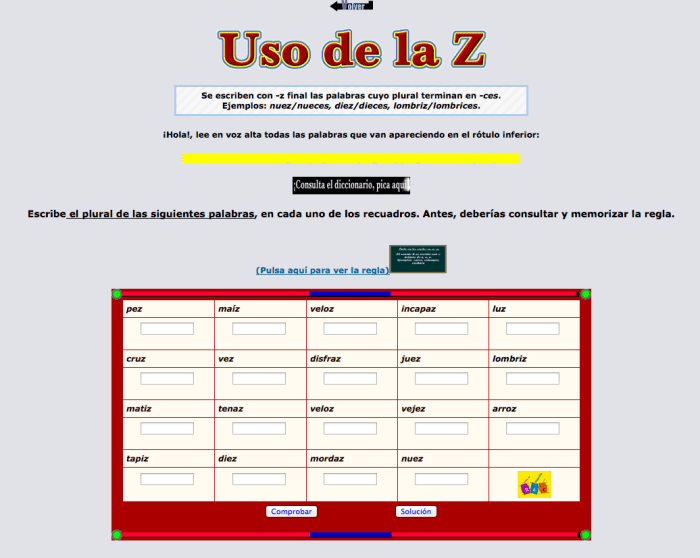
Words ending in “z” hold a captivating presence in literature and poetry, offering authors a nuanced tool to craft distinct effects and enhance their writing’s rhythm, rhyme, and emphasis.
Rhythm and Flow
The sibilant “z” sound creates a distinctive rhythm when placed at the end of words, contributing to the overall flow and cadence of a poem or prose. By incorporating words like “buzz,” “breeze,” and “gaze,” authors can create a sense of movement, energy, or tranquility, depending on the context.
Rhyme and Assonance
Words ending in “z” provide poets with rich opportunities for rhyme and assonance. Rhyming words like “buzz” and “fuzz” create a sense of cohesion and closure, while assonance, as in “breeze” and “freeze,” adds a subtle musicality to the verse.
Emphasis and Impact, Palabras que acaben en z
The “z” ending can lend a sense of emphasis and impact to specific words or phrases. By placing words like “jazzed” or “amazed” at the end of a line, authors can draw attention to their significance and create a lasting impression on the reader.
5. Common Errors and Misspellings
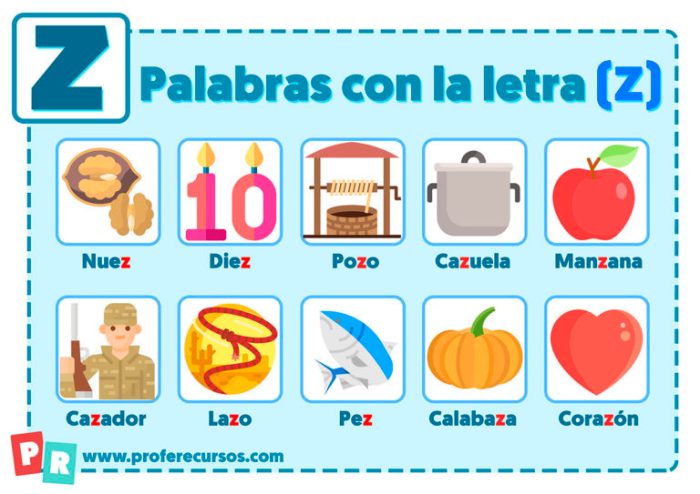
When writing words ending in “z,” several common errors and misspellings arise. Understanding these mistakes and their causes can help you avoid them in your writing.
Misspelling “z” as “s”
One common error is misspelling “z” as “s.” This error occurs because the “s” sound is often used in place of the “z” sound in informal speech. However, in formal writing, it is important to use the correct spelling.
- Incorrect: surprize
- Correct: surprise
- Incorrect: buz
- Correct: buzz
Omitting the “z”
Another common error is omitting the “z” at the end of a word. This error can occur when the “z” sound is not pronounced clearly. However, in formal writing, it is important to include the “z” to ensure the word is spelled correctly.
- Incorrect: thi
- Correct: this
- Incorrect: tho
- Correct: though
Strategies for Avoiding Errors
To avoid making these errors, consider the following strategies:
- Pay attention to the pronunciation of words ending in “z.” Make sure you are pronouncing the “z” sound clearly.
- When you are unsure how to spell a word ending in “z,” consult a dictionary or online resource.
- Practice writing words ending in “z” regularly. This will help you become more familiar with their correct spellings.
Frequently Asked Questions: Palabras Que Acaben En Z
What are some common errors associated with words ending in “z”?
One common error is misspelling words like “analyze” as “analize.” Another error is pronouncing words like “jazz” with a hard “z” sound instead of the correct soft “z” sound.
How can I avoid making mistakes with words ending in “z”?
To avoid errors, it’s helpful to familiarize yourself with the spelling and pronunciation rules for words ending in “z.” Additionally, practicing writing and speaking these words can enhance your accuracy.
